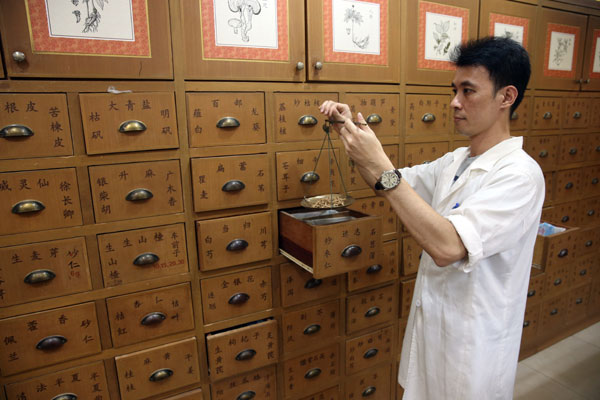 |
|
A clerk weighs traditional Chinese medicine in a Tongrentang pharmacy in Kuala Lumpur, Malaysia, in November, 2013. [Photo/China Daily] |
The Western world should learn to appreciate the value of the treasures of traditional Chinese medicine.
Although Tu Youyou, a winner of the 2015 Nobel Prize in Physiology or Medicine, was applauded in Stockholm when the Chinese pharmacologist declared that "the discovery of artemisinin is a gift to mankind from Traditional Chinese Medicine"; not all agreed with her view.
Even some at home pointed out Tu and her team used bio-chemical means to extract the active artemisinin from sweet wormwood half a century ago.
Yet Tu's inspiration is deeply rooted in thousands of years of TCM practice. The book that inspired her work, Handbook of Prescriptions for Emergencies (Zhouhou Beiji Fang), can be dated back to at least the Han Dynasty (206 BC–AD 220).
Although the traditional way of using these treatments has benefited Chinese for long, the processing highlighted by the Nobel prize carries its own advantages in prescription, actual taking of the medicine and logistic services. Further exploration offers abundant opportunities.
The earliest book of Chinese herbs, The Divine Farmer’s Classic on Roots and Herbs (Shennong Bencao Jing) cites 365 kinds of herbs including sweet wormwood. These are a gold mine for Chinese and multinational drug developers, which can be exploited to benefit millions of people.
In fact, apart from treating viruses, TCM has been most effective in predicting diseases, cultivating fitness, treating chronic, difficult, multi-source illnesses, and using non-medicinal methods such as acupuncture and breathing exercises.
Its theories of yin and yang, the five elements, jingluo cycles (meridian channels) and pulse feelings have been encapsulated in many popular Chinese sayings and idioms over the centuries.
One saying, “Treating the head in case of headache and the feet in case of foot-ache” refers not only to sub-par doctors but also ineffective problem-solving without tracing the root causes.

I’ve lived in China for quite a considerable time including my graduate school years, travelled and worked in a few cities and still choose my destination taking into consideration the density of smog or PM2.5 particulate matter in the region.